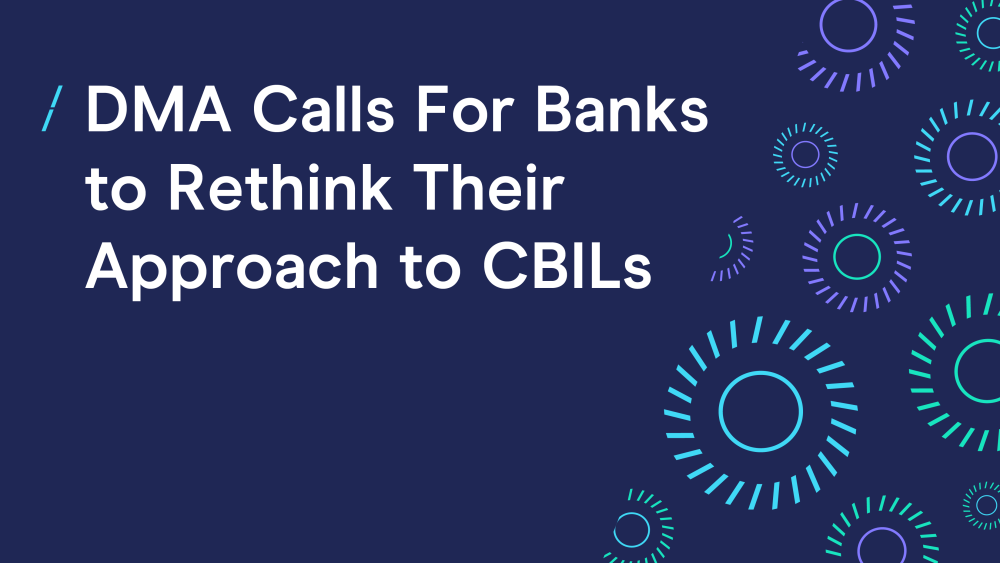DMA Calls For Banks to Rethink Their Approach to CBILs
27 Mar 2020

*Update: as of 1400 today, the 4 main banks have agreed to withdraw their demands for personal liability in repayment for the coronavirus business interruption loans. More information to follow on Monday.*
Earlier this week, the Chancellor Rishi Sunak announced Coronavirus Interruption Loan Scheme (CBILS) that was intended to allow small- and medium-sized businesses to borrow up to £5 million pounds to help them through the coronavirus pandemic. The Government said they would guarantee 80% of each loan and cover the first year of interest payments, meaning businesses would benefit from lower initial repayments.
This was intended to reduce barriers to lenders providing cash flow to SMEs in this extremely difficult time for businesses all across the economy.
However, dozens of DMA members have written to share their negative experiences with their banks when applying for a CBIL. Across the board, members have been shocked by the personal guarantees and interest rates they are being asked to agree. Many members who were asked for personal guarantees shared correspondence from Lloyd’s, Barclay’s and HSBC in particular.
Chris Combemale said:
“When the CBIL scheme was first announced, many of our member businesses across the UK were hopeful. They believed, like us, that the scheme would provide the essential cashflow required to survive the current crisis. The businesses we’ve spoken to expected the 80% guarantee to mean just that. Meaning that a loan of £100,000 would have 80% guaranteed by the government without the small business owner needing to guarantee the loan personally. However, that doesn’t appear to be how many banks are implementing the scheme.”
Attached is an extract from Lloyd’s application form which clearly indicates that the full liability would be owed by the business owner and recovered from them personally even after the business entered insolvency proceedings:
Example of how the guarantee works A UK business borrows £100,000 from the Bank as a 6-year loan under the CBIL scheme:
- Two years later the business fails with £80,000 still owed under this loan.
- The Bank pursues the client for the outstanding debt of £80,000.
- After all options are explored, £50,000 is claimed by the Bank under personal guarantees, leaving £30,000 outstanding.
- The Bank then makes a claim under the CBIL Scheme from the UK Government and £24,000 of the £30,000 remaining debt is paid to the Bank (80% of the remaining debt is the maximum which might be paid under the scheme).
- The Bank continues to look for repayment of the £30,000 from the customer. When, subsequently, the customer is able to pay £20,000 the Bank collects this and refunds £16,000 of it (80%) to UK Government – in line with the 80% paid by the Government.
- The customer remains liable for the £10,000 still outstanding. If this were to be repaid it would also be split with the Government in line with the guarantee claim.
The DMA is calling on the government and major banks to immediately clarify this scheme. Mr Combemale added:
“None of the SME member businesses that we’ve spoken to would be able to accept a loan on the terms banks are currently offering. Instead, many would be forced to choose insolvency, leading to the loss of tens of thousands of jobs across the UK’s data and marketing industry. We are calling on banks and the Government to see sense and work collectively to ensure that this does not happen by removing the need for SME owners to provide personal guarantees for these loans.”
The DMA recognises the unprecedented support the government has put in place. The DMA also recognises that some banks have not been asking for personal guarantees and that all the banks are doing a huge amount to help with mortgage holidays and card fees.
Nonetheless, while much of the business support is making a positive difference, the current arrangements of the Coronavirus Business Interruption Scheme will force many small businesses into destitution and failure; push employees out of work and onto Government support; and remove the stability and strength of the economy.
As the Government and banks recognise, this is a touch-and-go moment for a huge number of businesses across the economy. By the Government's own admission, not every business will survive. But there is a universal recognition that it is incumbent on the Government and businesses - and indeed every person in society - to do what they can to help others through this time. The DMA is now calling for the banks to help businesses in this spirit by removing the personal guarantees related to coronavirus business interruption loans to help the SME community survive the downturn in revenue.

Please login to comment.
Comments